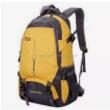**1. Eco-Friendly Backpacks:
- Look for backpacks made from sustainable materials like organic cotton, recycled polyester, or hemp. Brands like Patagonia, Fjällräven, and Cotopaxi offer options with eco-friendly materials.
**2. Upcycled or Recycled Backpacks:
- Some companies specialize in creating backpacks from upcycled or recycled materials, minimizing waste and reducing the demand for new resources.
**3. Fair Trade Certification:
- Choose backpacks from brands that are certified fair trade, ensuring ethical production practices and fair wages for workers.
**4. Minimal Packaging:
- Opt for brands that use minimal packaging or eco-friendly packaging materials to reduce waste.
**5. Durability:
- Invest in a durable backpack that will last for many trips, reducing the need for frequent replacements.
**6. Versatility:
- Choose a versatile backpack that can serve multiple purposes and adapt to different travel styles.
**7. Solar-Powered Backpacks:
- Some backpacks come with built-in solar panels that can charge your electronic devices using renewable energy.
**8. Repairability:
- Look for backpacks designed for easy repair, so you can extend their lifespan by fixing minor damages.
**9. Biodegradable Materials:
- Some brands offer backpacks made from biodegradable materials that break down naturally at the end of their life cycle.
**10. Local and Handmade Options: – Support local artisans and businesses by purchasing locally-made backpacks crafted with sustainable materials.
**11. Secondhand or Vintage Backpacks: – Consider buying secondhand or vintage backpacks from thrift stores, online marketplaces, or consignment shops.
**12. Carbon Offsetting: – Offset the carbon emissions of your travel by participating in carbon offset programs that support environmental projects.
**13. Water Conservation: – Choose backpacks that use water-resistant coatings free from harmful chemicals, and treat your backpack with eco-friendly waterproofing sprays.
**14. Pack Light: – Travel with only what you need to reduce the weight you carry and the resources required for production.
**15. Reuse and Repurpose: – After your backpack’s usable life, consider repurposing it as storage or donating it to someone in need.
**16. DIY Repair Kits: – Carry a small repair kit for your backpack, including patches, thread, and needles to fix minor issues on the go.
**17. Conscious Consumption: – Choose quality over quantity and buy products that align with your values and sustainable lifestyle.
By making eco-friendly choices when it comes to your backpack and travel gear, you can contribute to a more sustainable and responsible way of exploring the world. Every small action counts towards reducing your ecological footprint and promoting positive change.


























